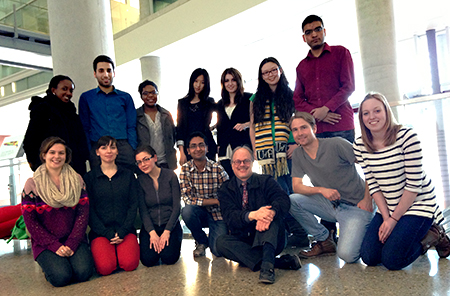
Back row (l to r): Arlette Magbity, Shubham Shan, Cynthia Agwo, Betty Wang, Ines Zuna, Shauna Regan, Gaurav Luthra. Front row (l to r): Jill McCann (peer mentor), Katherine Fizell (peer mentor), Ghasak Hussain, Damanjit Goondi, Dr. Glen R. Loppnow (instructor), Taylor Robertson, Nicola Mulberry. Not shown: Natasha Hawryluk
Based on the successes of unconventional courses like Science 100, an integrated cohort based first-year science program, and Computing 250, a multidisciplinary game development course that integrates music and art, Science 299-Science Citizenship-is a course aimed at getting science students fired up about global problems. 299 students are asked to choose a global problem and develop a strategy towards a real-world solution, including a thorough review of the scientific literature and their solution that can be implemented as a local solution.
"It's those students who are particularly passionate about a particular global issue or are the type of students who are very socially engaged and want to make change. Some students have had some very personal things happen to them and that they want to try to and address in a way that benefits not only people that are close to them, but others," says Loppnow
As a departure from regular science class, in Science 299, there are no formal exams, assignments or even lectures (there is, however, class time dedicated for group work and review). Initially, students are asked to write down a list of issues they are passionate about. Then the students form project cohorts around common passions, and start developing science-based solutions to the problems. Grades are assigned through peer review and instructor assessments based on the significance of the problem in the global arena, the scientific foundation that their solutions are based upon, and most critically, the creativity of their presentation and solution.
"Creativity is so fundamental to their future career as scientists. We always have to try to find very creative solutions to the things we are trying to study. It's not something that we typically emphasize in our normal science undergraduate curriculum. Plus, it's fun. When you see the students do a creative presentation it's much more engaging and gets much more buy in to the problems and solutions they've come up with than if it's not creative," adds Loppnow.
This year, the breakdown of the students in the course was primarily students of Chemistry, Biology and Psychology, with representatives from Physics, Physiology and Pharmacology. In the future, Loppnow envisions a more diverse breakdown of science students, including Math, Earth Sciences and Computing Science and expects that in the coming years, the course will grow into more of a mainstream option for science students, and that their projects will go on to have influence throughout Alberta and the world at large.
This is how these students activate locally on global problems:
#Alberta Water Conservation Initiative
Taylor Robertson, Natascha Hawryluk and Nicola Mulberry
Problem: A lack of government policy on grey water systems and recycled water standards.
Strategy: Promoting responsible water use by educating people about their water footprint and available systems for managing their water use. Increasing awareness on campus through lectures and events, like Water Week. Education on grey water system effectiveness, cost and availability to the campus community. Future plans include government lobbying for better policy.
#SmarTech Handling
Betty Wang, Ines Zuna and Daman Goondi
Problem: Inappropriate handling and disposal of harmful consumer technologies, such as rechargeable batteries, used electronics and ink cartridges.
Strategy: Public outreach and education through posters, pamphlets and community drives on common misconceptions regarding consumer technologies, how they work, and how to dispose of them. Collaboration with SustainSU and InfoLink to make battery disposal stations more visible and accessible on campus.
#Chronic Disease Prevention
Ghasak Hussain and Shubham Shan
Problem: The rising incidence of preventable chronic disease through lack of healthy diet and exercise.
Strategy: Early childhood education on healthy eating and exercise, instilling motivation to lead a healthier lifestyle. Fun and engaging presentations to children as young as 6 years old that outline the risks associated with poor lifestyle, and the simple lifestyle changes that can reduce the risk of developing a chronic disease. A student group on campus was founded to continue educating Edmonton area school children on the subject of chronic disease prevention.
#Intimate Partner Violence
Arlette Magbity, Cynthia Agwo, Gaurav Luthra and Shauna Regan
Problem: Harm caused by physical, emotional and sexual abuse for current or former intimate partners, which lies outside the definition of domestic violence.
Strategy: Raise awareness of intimate partner violence and its psychological effects through a campaign on campus entitled 'Quiet the Elephant' through the use of postering, YouTube and Facebook campaigns, and a dedicated website: www.quiettheelephant.com. Future plans include creating a student group and rehabilitation centre for victims of intimate partner violence.